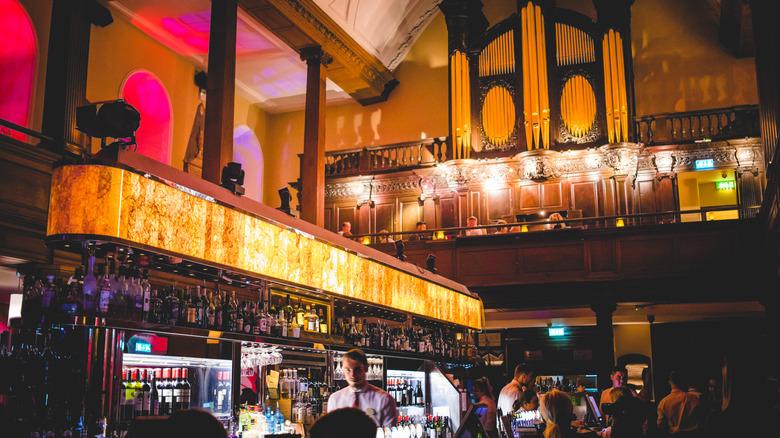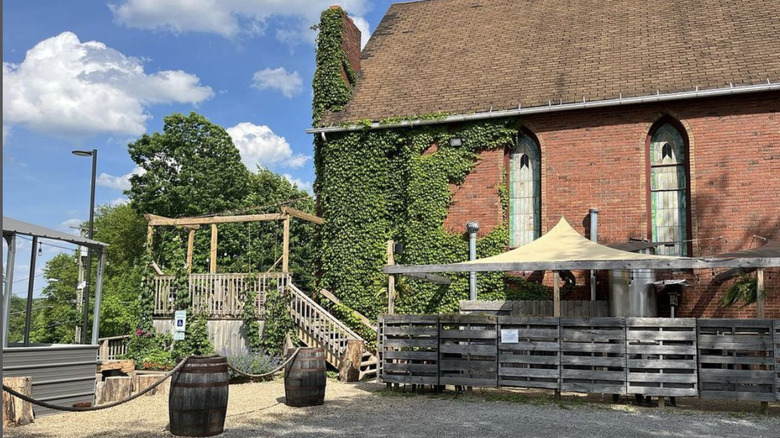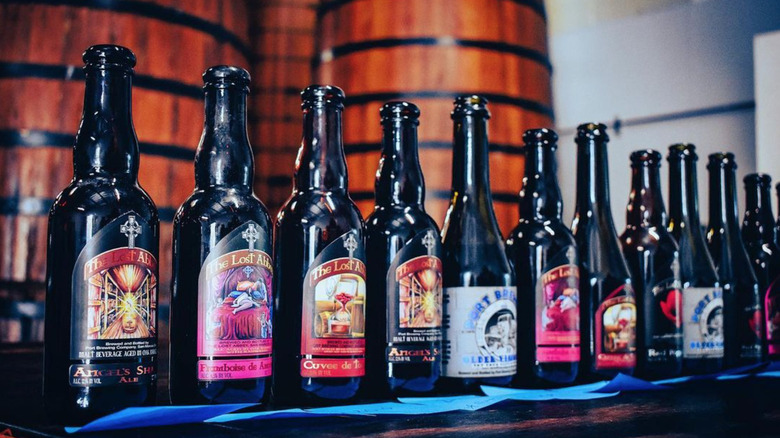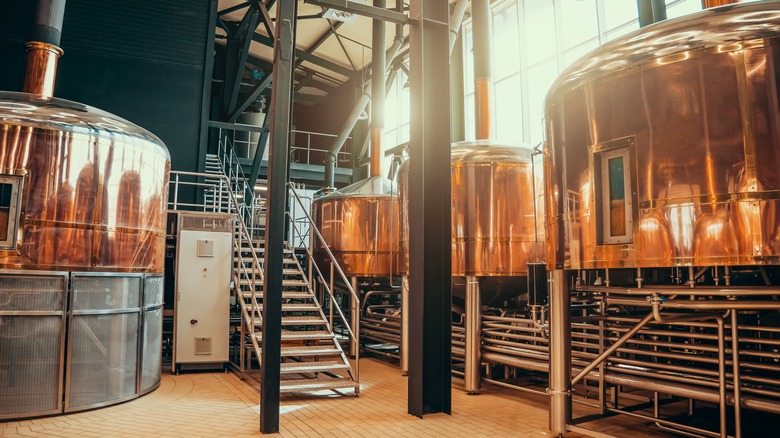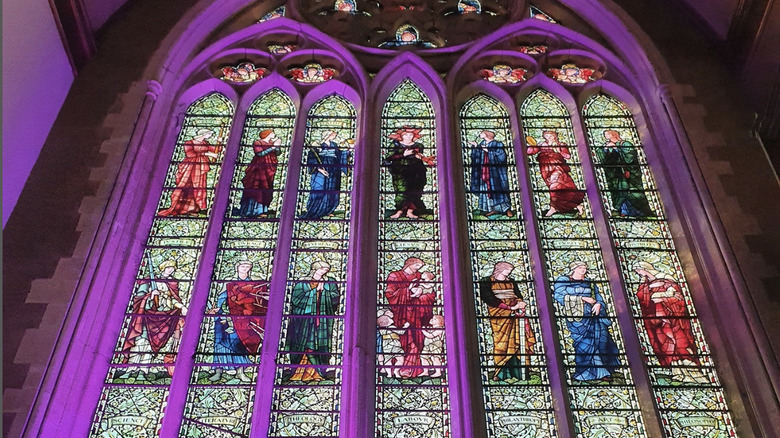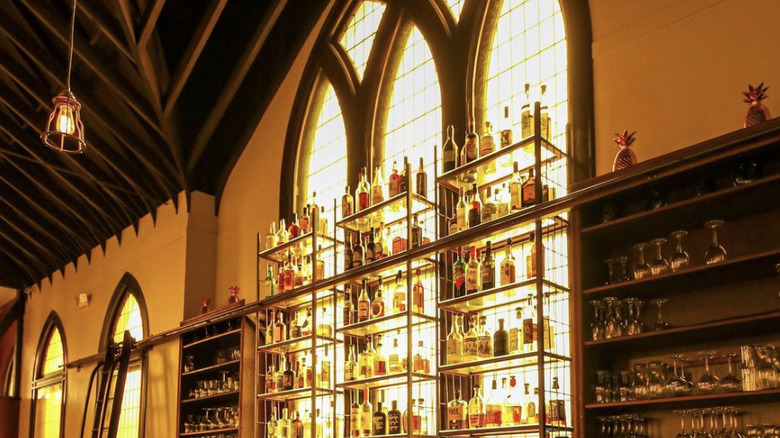The Real Reason Breweries Are Often Built In Old Churches
As of 2022, 30 breweries in the United States are housed in former churches, according to the Associated Press. While transforming a space of religious worship into one for alcohol may seem blasphemous to some, churches and brewing beer have a long history. Benedictine monks began brewing beer over 1,500 years ago and are to thank for adding hops to beer, which they used as a preservative (per Loyola Press).
Medieval Benedictine monks brewed beer to follow "The Rule of St. Benedictus" or The Rule that requires monasteries to be self-sustaining. This edict translated into monks growing their food and brewing their beer. Beer, high in nutrients, helped sustain monks through the 40-day fasting period of Lent (via Catholic News Agency). As a part of The Rule, says Loyola Press, monks vowed to provide food and shelter to travelers and those in need. Often, serving guests beer was often a better option than unsanitary water.
In recent years, this beermaking tradition has been revived. In 2012, the Pope visited the Monastero di San Benedetto upon the opening of their brewery Birra Nursia in St. Benedict's birthplace of Norcia, Italy (per Italy Magazine). From a historical perspective, breweries finding new homes in former churches is the natural next step in a centuries-old partnership.
Why are former churches ideal for breweries?
One reason that former churches are excellent for breweries is that they're readily-available large spaces. The economic recession of 2007 forced many churches to close, starting an ongoing trend, says Associated Press. As people tightened their wallets, churches began seeing fewer attendants and had no other choice but to close.
Further complicating the matter, churches are tricky properties. Old churches also don't have many options in terms of repurposing since they don't easily convert into other types of businesses or housing, says the Church Executive. It explains that no longer used churches with historical landmark status are put into a bind since laws state that developers cannot significantly change them. Still, the buildings do not easily transform into another type of functional space. As a result, former churches become bound up in legal limbo. They sit unused and derelict (via Associated Press).
Breweries provide a solution. The unique architecture of churches — large spaces with high ceilings — is excellent for large brewing equipment. Since churches are gathering places for crowds of congregants, former churches can already accommodate many brewery patrons (per Associated Press). As a bonus, the intricate details of stained glass windows and decor make for eclectic and intriguing spaces.
Breweries are transforming unused spaces
The architectural benefits of a former church, plus an excellent price and location, drew Ira Gerhart to a 1923 Presbyterian church. The building now houses his brewery Noble Creature Caskhouse in Youngstown, Ohio (per Associated Press). The brewery takes up the community-serving mission of the former church, stating it hopes "be a launch pad for the next step in Youngstown revitalization" and "a sustainable and community-focused project with a healthy future," according to its website.
Gerhart isn't alone. Many owners of breweries in churches aim to preserve parts of the original church, whether through community-building, architecture, or both. Pittsburgh's Church Brew Works preserved much of the building's original architecture to serve its new purpose. Owner Sean Casey and his team converted the pews into benches and used the building's original wood to make the bar (via Craft Beer). They were able to keep the original stained glass and restore the original lamps and the Douglas fir floors. Casey told the Associated Press that the church's wide-open interior is similar to German beer halls, making the space appealing and the conversion natural.
On a larger scale, the McMenamins company has transformed at least 56 historic sites into multipurpose venues, including hotels, spas, coffee roasters, theaters, bakeries, and pools, often with breweries as a part of the complexes. Their Old Church Brewery in Wilsonville, Oregon, is a church-turned brewery and an outdoor amphitheater (via McMenamins).
Former churches are abundant in creative opportunities
Churches offer a unique canvas for their owners to experiment with creative themes and design. They also offer up excellent opportunities for religion-based puns. For example, the San Diego-area Lost Abbey Brewing's location called Church is separated into two sections, one for "saints" and the other for "sinners" — each with its own sinful or saintly decor. Similarly, the brewery offers a selection of pious beers like "10 Commandments" and more sinful varieties such as "Serpent's Stout."
Tomme Arthur, a co-founder of The Lost Abbey, explained that "What's great is that every time that we need some sort of inspiration, we're able to open up the Bible" (via Associated Press).
The unique architecture of churches naturally offers macabre and gothic design opportunities. For example, Father John's in Bryan, Ohio, boasts a crypt discovered during a renovation (Craft Beer). Patrons can see the coffin through glass installed on the floor.
Resistance to breweries in churches
Not all are charmed by the idea of turning a church into a brewery. Michael Schafer, the spokesman for the Archdiocese of Cincinnati, told the Associated Press, "We don't want (churches) to become a liquor store." He continued, "We don't think that's appropriate for a house of worship."
Ira Gerhart of Noble Creature Caskhouse concedes, "I get it, you know, just the idea of putting a bar in God's house." He explained to the Associated Press, "If we didn't choose to do this, most likely, it'd fall down or get torn down. I told them we're not going to be a rowdy college bar." However, church-turned-breweries have support from within the religious community.
According to the Akron Beacon Journal, The Taft's Ale House in Cincinnati received a special ceremony from a local church leader. Reverend John Kroger performed a blessing for the beers for the ale house, which is housed in the former St. Paul's Evangelical Protestant Church (via the Associated Press). And pastors themselves are taking up brewing, like Chris VanHall, the Greater Purpose Community Church pastor and the brewer at Greater Purpose Brewing in Santa Cruz, California. He told Vine Pair, "There's nothing in the Bible that says you can't drink alcohol in a responsible manner."
Church services in a brewery
Some religious organizations are flipping the script and holding church services and other religious events like bible study in breweries to attract attendees like Church-in-a-Pub in Fort Worth, Texas (via NPR), Pub Church in Boston, or the monthly Beer and Hymns event held by First Christian Church in Portland, Oregon.
Amy Piatt, a senior pastor at First Christian Church, told NPR in 2013 that the definition of attending church is changing, "It's probably, in the very near future, not going to be at 10 am on Sunday morning wearing your best shoes and tie or dress." Instead, she explains, "It's going to be something different ... But it's still holy, God is still there, and that's what's most important."
The goal of holding church services in a brewery is visibility, attracting members, and finding innovative ways to nurture the church's already established community. Annie Blazer, associate professor of religious studies at the College of William and Mary, told Religion News that churches have a history of innovating and getting creative to attract new worshipers. "Churches have long used sports ministry, movies and entertainment, music and other pop culture to target a non-Christian audience," Blazer said.
Breweries are simply the latest move in the ever-transforming role of the church.
Churches-turned-bars worth traveling for
In addition to breweries, former churches are getting made over into fascinating food, drink, and nightlife venues. Many are worth adding to your travel itinerary or even making a detour. New Orleans' Vessel is a 1914 church transformed into a restaurant and bar, which serves gulf-inspired cocktails and food underneath the impressive wooden arches, hanging lanterns, and stained glass windows. On an even larger scale, The Pitcher and Piano's Nottingham location in the UK is an expansive bar and restaurant within a gothic-style former Unitarian church (National Design Academy). The church's arched doorways, Greco-Roman columns, and reclaimed pews are equal parts museum and sophisticated bar (via The Manual).
For those in Denver looking for some punk history and a place to dance the night away, The Manual suggests visiting The Church of the Seven Candles or just "The Church" in Denver. A former 1889 Episcopal Church turned dance club, The Church's long history as a nightlife venue started when it became a punk venue called the Sanctuary. Since the mid-'90s, the former church has been a nightclub where patrons dance under the gothic vaulted ceilings (via Co Clubs). Famous performers at The Church of the Seven Candles include Moby and Prince, reports The Manual.
The Church-turned entertainment venue seems to be here to stay. For former churches stuck in legal limbo, these new multi-use spaces that enrich and enliven their neighborhoods are enjoyable (and often delicious) new leases on life.
